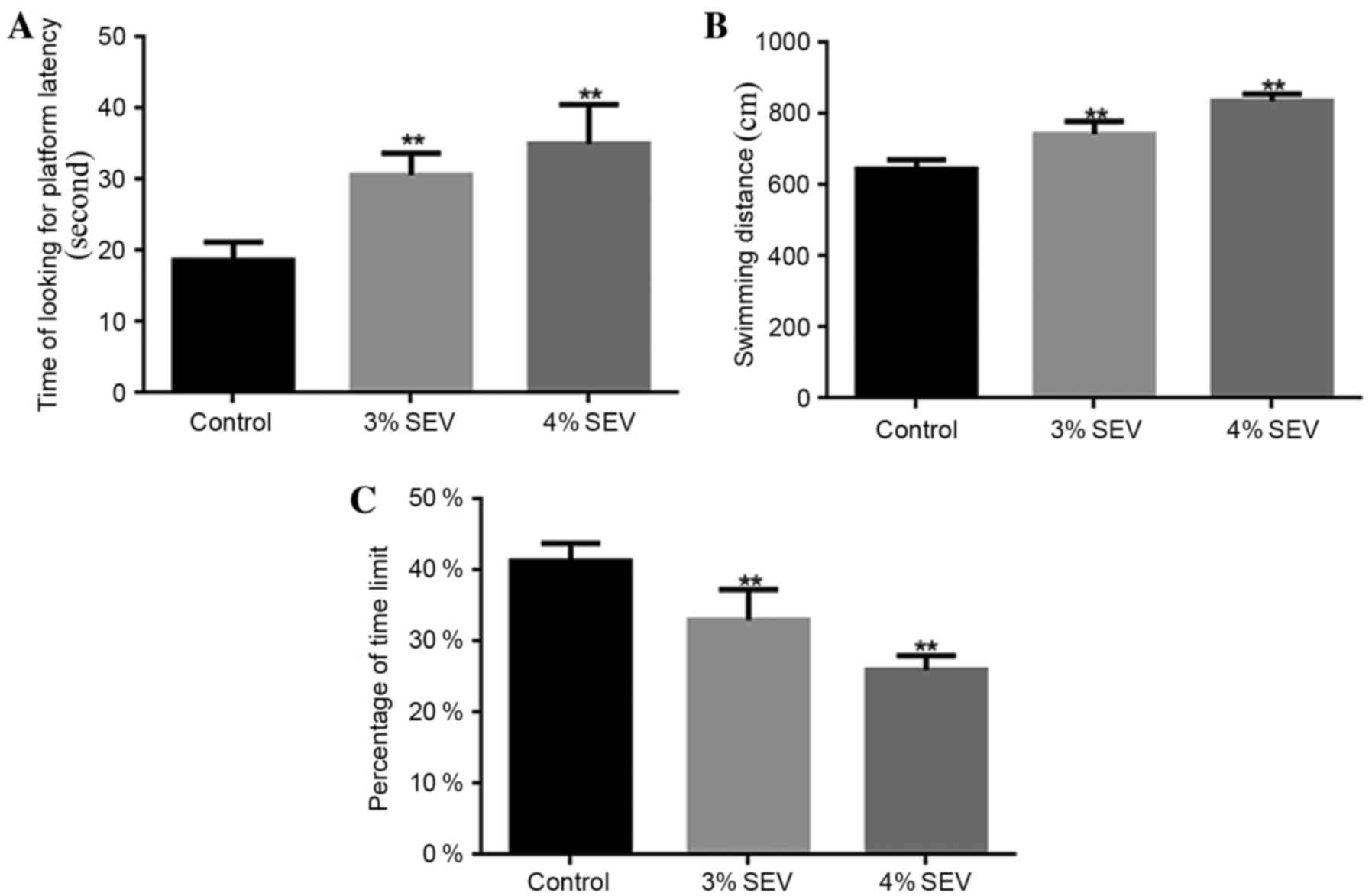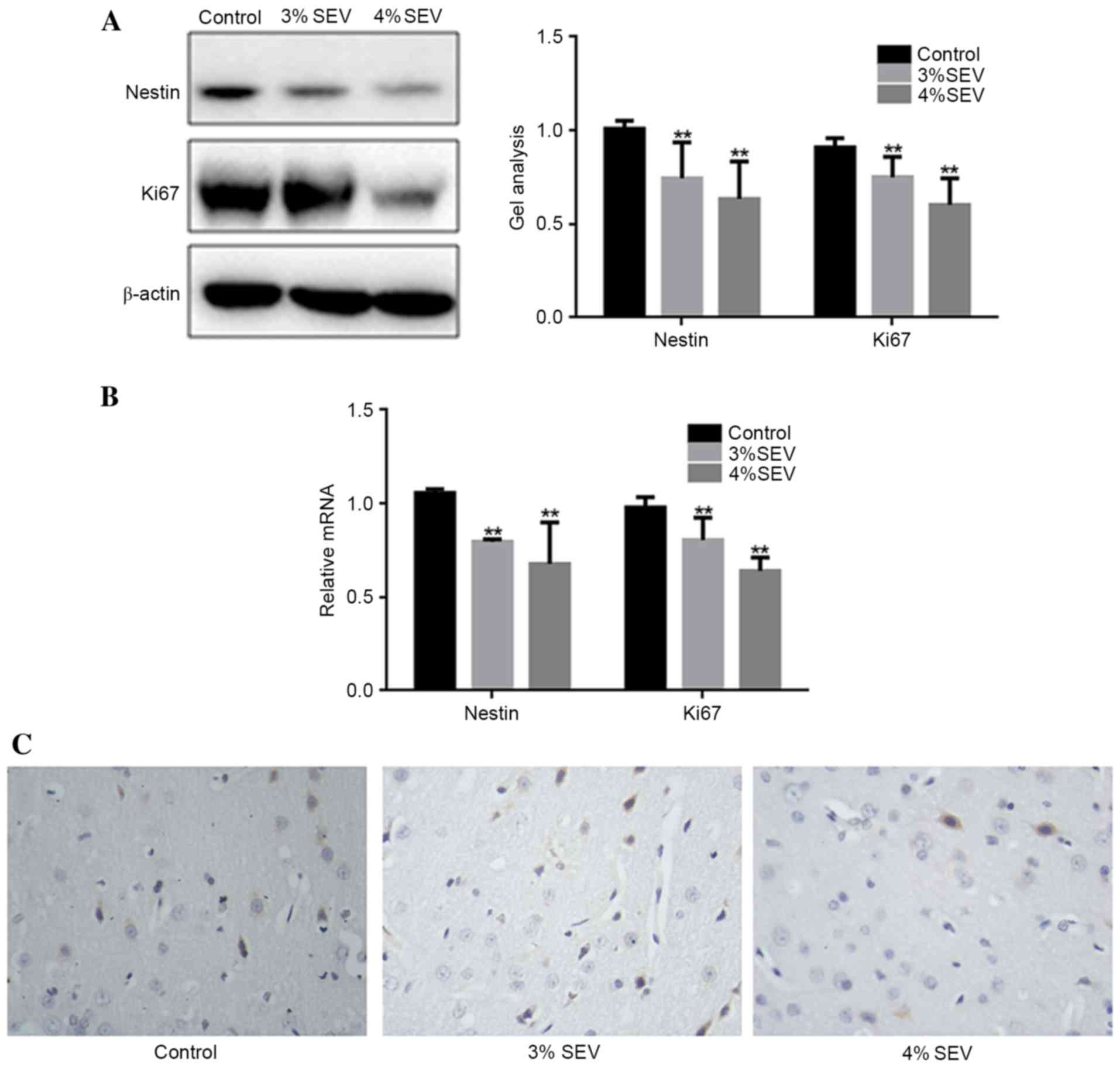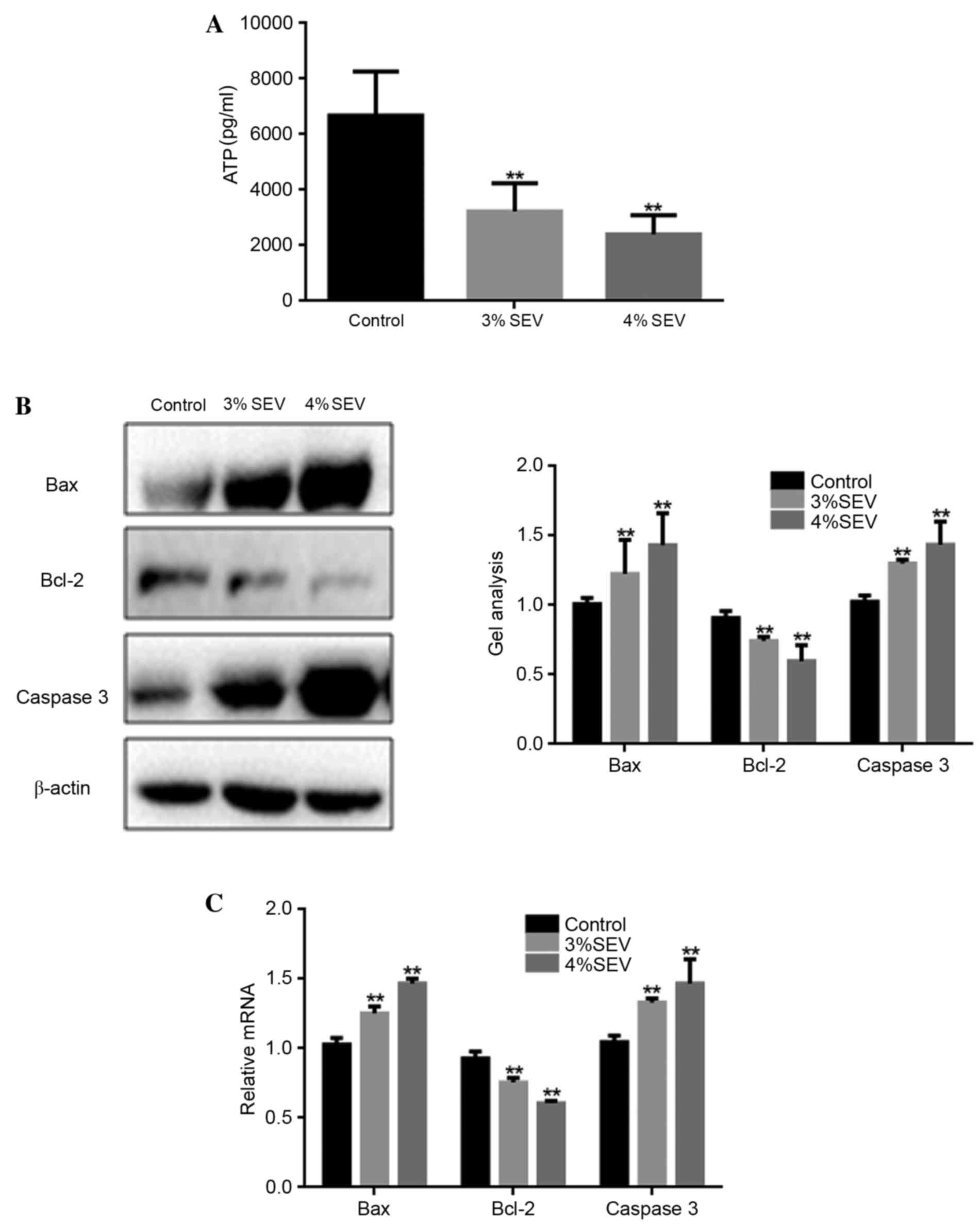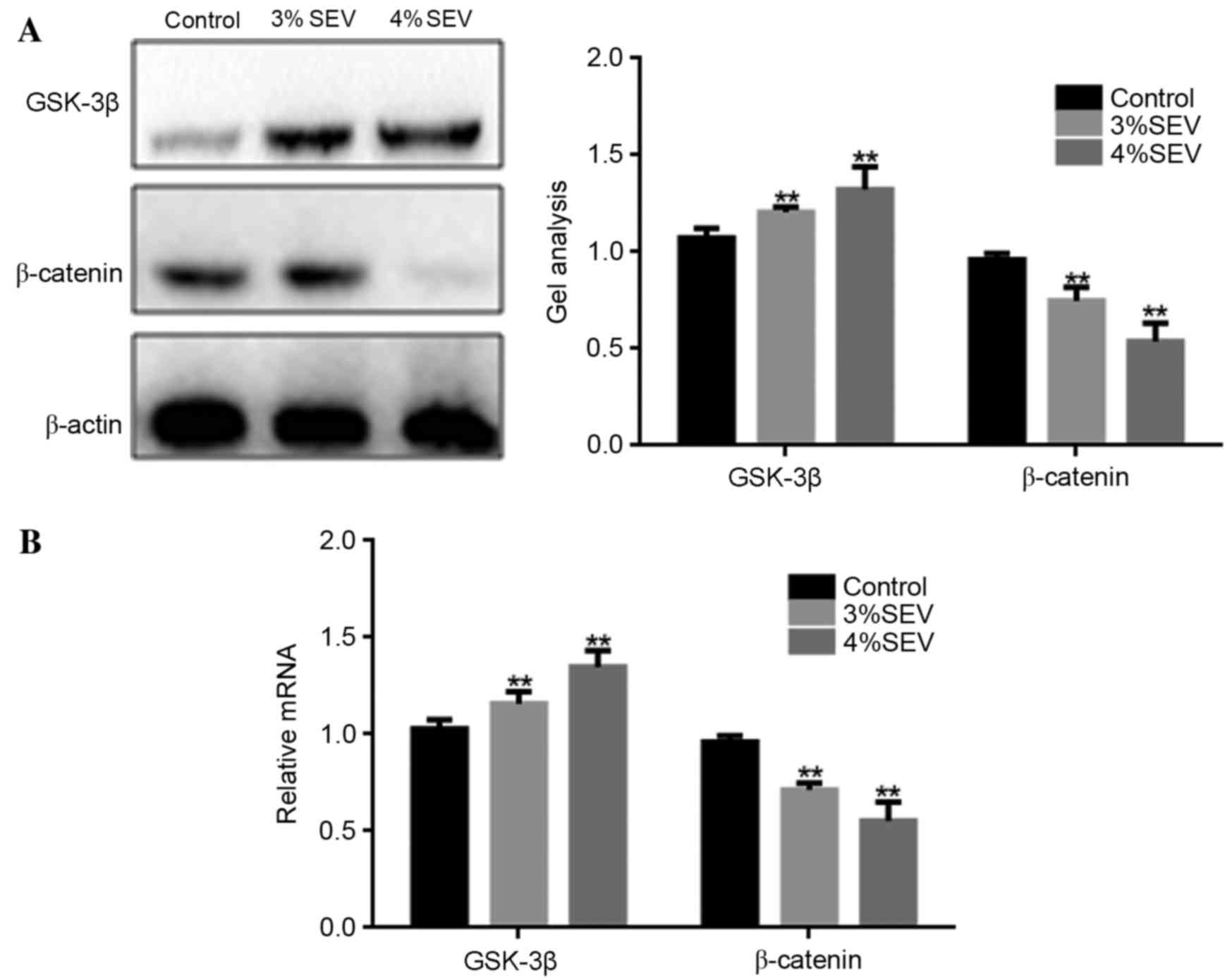|
1
|
Heesen M and Klimek M: Nonobstetric
anesthesia during pregnancy. Curr Opin Anaesthesiol. 29:297–303.
2016. View Article : Google Scholar : PubMed/NCBI
|
|
2
|
Owsiak JN and Bullough AS: Chronic myeloid
leukemia in pregnancy: An absolute contraindication to neuraxial
anesthesia? Int J Obstet Anesth. 25:85–88. 2016. View Article : Google Scholar : PubMed/NCBI
|
|
3
|
Miller TL, Park R and Sun LS: Report on
the Fifth PANDA Symposium on ‘Anesthesia and Neurodevelopment in
Children’. J Neurosurg Anesthesiol. 28:350–355. 2016. View Article : Google Scholar : PubMed/NCBI
|
|
4
|
Stratmann G: Review article: Neurotoxicity
of anesthetic drugs in the developing brain. Anesth Analg.
113:1170–1179. 2011. View Article : Google Scholar : PubMed/NCBI
|
|
5
|
Costi D, Cyna AM, Ahmed S, Stephens K,
Strickland P, Ellwood J, Larsson JN, Chooi C, Burgoyne LL and
Middleton P: Effects of sevoflurane versus other general
anaesthesia on emergence agitation in children. Cochrane Database
Syst Rev CD007084. 2014. View Article : Google Scholar
|
|
6
|
Lorsomradee S, Cromheecke S, Lorsomradee S
and De Hert SG: Effects of sevoflurane on biomechanical markers of
hepatic and renal dysfunction after coronary artery surgery. J
Cardiothorac Vasc Anesth. 20:684–690. 2006. View Article : Google Scholar : PubMed/NCBI
|
|
7
|
Head BP and Patel P: Anesthetics and brain
protection. Curr Opin Anaesthesiol. 20:395–399. 2007. View Article : Google Scholar : PubMed/NCBI
|
|
8
|
Istaphanous GK, Howard J, Nan X, Hughes
EA, McCann JC, McAuliffe JJ, Danzer SC and Loepke AW: Comparison of
the neuroapoptotic properties of equipotent anesthetic
concentrations of desflurane, isoflurane, or sevoflurane in
neonatal mice. Anesthesiology. 114:578–587. 2011. View Article : Google Scholar : PubMed/NCBI
|
|
9
|
Shen X, Dong Y, Xu Z, Wang H, Miao C,
Soriano SG, Sun D, Baxter MG, Zhang Y and Xie Z: Selective
anesthesia-induced neuroinflammation in developing mouse brain and
cognitive impairment. Anesthesiology. 118:502–515. 2013. View Article : Google Scholar : PubMed/NCBI
|
|
10
|
Li Y, Zeng M, Chen W, Liu C, Wang F, Han
X, Zuo Z and Peng S: Dexmedetomidine reduces isoflurane-induced
neuroapoptosis partly by preserving PI3K/Akt pathway in the
hippocampus of neonatal rats. PLoS One. 9:e936392014. View Article : Google Scholar : PubMed/NCBI
|
|
11
|
Joksimovic M and Awatramani R:
Wnt/β-catenin signaling in midbrain dopaminergic neuron
specification and neurogenesis. J Mol Cell Biol. 6:27–33. 2014.
View Article : Google Scholar : PubMed/NCBI
|
|
12
|
Parish CL and Thompson LH: Modulating Wnt
signaling to improve cell replacement therapy for Parkinson's
disease. J Mol Cell Biol. 6:54–63. 2014. View Article : Google Scholar : PubMed/NCBI
|
|
13
|
Lange C, Mix E, Rateitschak K and Rolfs A:
Wnt signal pathways and neural stem cell differentiation.
Neurodegener Dis. 3:76–86. 2006. View Article : Google Scholar : PubMed/NCBI
|
|
14
|
Dai ZM, Sun S, Wang C, Huang H, Hu X,
Zhang Z, Lu QR and Qiu M: Stage-specific regulation of
oligodendrocyte development by Wnt/β-catenin signaling. J Neurosci.
34:8467–8473. 2014. View Article : Google Scholar : PubMed/NCBI
|
|
15
|
L'Episcopo F, Tirolo C, Testa N, Caniglia
S, Morale MC, Deleidi M, Serapide MF, Pluchino S and Marchetti B:
Plasticity of subventricular zone neuroprogenitors in MPTP
(1-methyl-4-phenyl-1,2,3,6-tetrahydropyridine) mouse model of
Parkinson's disease involves cross talk between inflammatory and
Wnt/β-catenin signaling pathways: Functional consequences for
neuroprotection and repair. J Neurosci. 32:2062–2085. 2012.
View Article : Google Scholar : PubMed/NCBI
|
|
16
|
Liu H and Lou W: Functioning
remobilization of the paralyzed vocal cord using the split-vagus
nerve procedure in rats the split-vagus nerve procedure in rats.
Lin Chung Er Bi Yan Hou Tou Jing Wai Ke Za Zhi. 24:273–275.
2010.(In Chinese). PubMed/NCBI
|
|
17
|
Schoenfeld R, Schiffelholz T, Beyer C,
Leplow B and Foreman N: Variations of the Morris water maze task to
comparatively assess human and rodent place navigation. Neurobiol
Learn Mem. 139:117–127. 2017. View Article : Google Scholar : PubMed/NCBI
|
|
18
|
Radahmadi M, Alaei H, Sharifi MR and
Hosseini N: Effect of forced exercise and exercise withdrawal on
memory, serum and hippocampal corticosterone levels in rats. Exp
Brain Res. 233:2789–2799. 2015. View Article : Google Scholar : PubMed/NCBI
|
|
19
|
Livak KJ and Schmittgen TD: Analysis of
relative gene expression data using real-time quantitative PCR and
the 2(−Delta Delta C(T)) Method. Methods. 25:402–408. 2001.
View Article : Google Scholar : PubMed/NCBI
|
|
20
|
Patel D and Chaudhary J: Increased
expression of bHLH transcription factor E2A (TCF3) in prostate
cancer promotes proliferation and confers resistance to doxorubicin
induced apoptosis. Biochem Biophys Res Commun. 422:146–151. 2012.
View Article : Google Scholar : PubMed/NCBI
|
|
21
|
Lerman J, Sikich N, Kleinman S and Yentis
S: The pharmacology of sevoflurane in infants and children.
Anesthesiology. 80:814–824. 1994. View Article : Google Scholar : PubMed/NCBI
|
|
22
|
Liang G, Ward C, Peng J, Zhao Y, Huang B
and Wei H: Isoflurane causes greater neurodegeneration than an
equivalent exposure of sevoflurane in the developing brain of
neonatal mice. Anesthesiology. 112:1325–1334. 2010. View Article : Google Scholar : PubMed/NCBI
|
|
23
|
Shen X, Liu Y, Xu S, Zhao Q, Guo X, Shen R
and Wang F: Early life exposure to sevoflurane impairs adulthood
spatial memory in the rat. Neurotoxicology. 39:45–56. 2013.
View Article : Google Scholar : PubMed/NCBI
|
|
24
|
Takaenoki Y, Satoh Y, Araki Y, Kodama M,
Yonamine R, Yufune S and Kazama T: Neonatal exposure to sevoflurane
in mice causes deficits in maternal behavior later in adulthood.
Anesthesiology. 120:403–415. 2014. View Article : Google Scholar : PubMed/NCBI
|
|
25
|
Kruger K, Stefansson IM, Collett K, Arnes
JB, Aas T and Akslen LA: Microvessel proliferation by co-expression
of endothelial nestin and Ki-67 is associated with a basal-like
phenotype and aggressive features in breast cancer. Breast.
22:282–288. 2013. View Article : Google Scholar : PubMed/NCBI
|
|
26
|
Hirabayashi Y, Itoh Y, Tabata H, Nakajima
K, Akiyama T, Masuyama N and Gotoh Y: The Wnt/beta-catenin pathway
directs neuronal differentiation of cortical neural precursor
cells. Development. 131:2791–2801. 2004. View Article : Google Scholar : PubMed/NCBI
|
|
27
|
Rudloff S and Kemler R: Differential
requirements for β-catenin during mouse development. Development.
139:3711–3721. 2012. View Article : Google Scholar : PubMed/NCBI
|
|
28
|
Lupo G, Novorol C, Smith JR, Vallier L,
Miranda E, Alexander M, Biagioni S, Pedersen RA and Harris WA:
Multiple roles of Activin/Nodal, bone morphogenetic protein,
fibroblast growth factor and Wnt/β-catenin signalling in the
anterior neural patterning of adherent human embryonic stem cell
cultures. Open Biol. 3:1201672013. View Article : Google Scholar : PubMed/NCBI
|
|
29
|
Castelo-Branco G and Arenas E: Function of
Wnts in dopaminergic neuron development. Neurodegener Dis. 3:5–11.
2006. View Article : Google Scholar : PubMed/NCBI
|
|
30
|
Cole AR: GSK3 as a Sensor Determining Cell
Fate in the Brain. Front Mol Neurosci. 5:42012. View Article : Google Scholar : PubMed/NCBI
|
|
31
|
Fuchs C, Trazzi S, Torricella R, Viggiano
R, De Franceschi M, Amendola E, Gross C, Calzà L, Bartesaghi R and
Ciani E: Loss of CDKL5 impairs survival and dendritic growth of
newborn neurons by altering AKT/GSK-3β signaling. Neurobiol Dis.
70:53–68. 2014. View Article : Google Scholar : PubMed/NCBI
|
|
32
|
Kim WY, Wang X, Wu Y, Doble BW, Patel S,
Woodgett JR and Snider WD: GSK-3 is a master regulator of neural
progenitor homeostasis. Nat Neurosci. 12:1390–1397. 2009.
View Article : Google Scholar : PubMed/NCBI
|
|
33
|
Morales-Garcia JA, Luna-Medina R,
Alonso-Gil S, Sanz-Sancristobal M, Palomo V, Gil C, Santos A,
Martinez A and Perez-Castillo A: Glycogen synthase kinase 3
inhibition promotes adult hippocampal neurogenesis in vitro and in
vivo. ACS Chem Neurosci. 3:963–971. 2012. View Article : Google Scholar : PubMed/NCBI
|
|
34
|
Munji RN, Choe Y, Li G, Siegenthaler JA
and Pleasure SJ: Wnt signaling regulates neuronal differentiation
of cortical intermediate progenitors. J Neurosci. 31:1676–1687.
2011. View Article : Google Scholar : PubMed/NCBI
|
|
35
|
Kalani MY, Cheshier SH, Cord BJ, Bababeygy
SR, Vogel H, Weissman IL, Palmer TD and Nusse R: Wnt-mediated
self-renewal of neural stem/progenitor cells. Proc Natl Acad Sci
USA. 105:16970–16975. 2008. View Article : Google Scholar : PubMed/NCBI
|
|
36
|
Kunke D, Bryja V, Mygland L, Arenas E and
Krauss S: Inhibition of canonical Wnt signaling promotes
gliogenesis in P0-NSCs. Biochem Biophys Res Commun. 386:628–633.
2009. View Article : Google Scholar : PubMed/NCBI
|
|
37
|
Galli S, Lopes DM, Ammari R, Kopra J,
Millar SE, Gibb A and Salinas PC: Deficient Wnt signalling triggers
striatal synaptic degeneration and impaired motor behaviour in
adult mice. Nat Commun. 5:49922014. View Article : Google Scholar : PubMed/NCBI
|


















